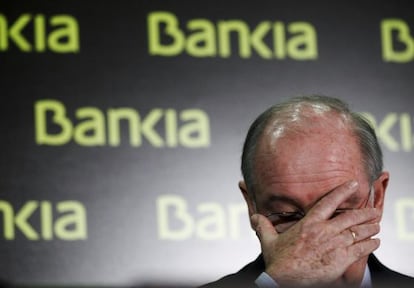Former Bankia chief denies wrongdoing in flotation of lender
Rodrigo Rato claims that merger process was “completely supervised” by the Bank of Spain

“There was no intention to mislead anyone, nor was there any possibility that we could have misled anyone.” That was how the former chairman of nationalized Spanish lender Bankia, Rodrigo Rato, answered accusations of fraud regarding the bank’s merger and stock market listing.
Speaking on radio station Onda Cero on Friday, Rato was responding to a report that has been drawn up by judicial investigators into the bank’s flotation and state bailout. The document, which was made public yesterday and has been handed over to High Court Judge Fernando Andreu, questions the validity of Bankia’s accounts and suggests that hundreds of thousands of small investors were swindled.
This was not a conspiracy; we listed in very difficult circumstances”
In his interview, Rato argued that the bank was not acting “alone” and that it was “completely supervised” during its creation – which resulted from a merger of Caja Madrid, Bancaja and a number of other Spanish savings banks – and during its stock market debut in July 2011.
“This was not a conspiracy. We listed [on the stock exchange] in very difficult circumstances,” Rato argued, explaining that the Bank of Spain sent letters to all of the merging lenders with its “vision and numbers on the situation and the expected losses.” These letters are included in the judicial probe, but the former Bankia chairman does not believe that they have been taken into account by investigators.
Rato described the report as “highly debatable” and pointed out several contradictions between its conclusions and the actions of the Bank of Spain.
With regard to alleged irregularities in the listing of Bankia shares, Rato claimed that “purchase orders had not been inflated,” and offered as evidence the fact that the share price held steady after the flotation and that the number of foreign investors doubled in six months.
The report found that a significant percentage of the buy orders at the listing came from companies linked to the bank, as well as clients whose operations had been refinanced or who were behind on their debt repayments. Some of these investors immediately resold their shares, which, the report says, throws into doubt the interest they had in participating in the operation. The document quantifies the damage caused to investors at €3.092 billion.
The judicial investigators also questioned Deloitte, which was in charge of auditing Bankia’s accounts. Rato responded by describing the firm as the “number one financial auditor in Spain,” and pointed out that it had signed off its reports on Caja Madrid and Bancaja “with no exceptions.”
Rato, who is also a former International Monetary Fund chief, also spoke about the Caja Madrid “black cards” scandal, related to undeclared personal expenses totaling €15.5 million that executives and board members at the bank racked up over 10 years. He told his interviewers that calling these cards “opaque” and “black” was mistaken as there was “nothing less black than a credit card made out to a specific person.” As he did when he appeared before the judge investigating the use of the cards, he argued that he was under the impression that the money available to him via the credit card formed part of his salary.
Tu suscripción se está usando en otro dispositivo
¿Quieres añadir otro usuario a tu suscripción?
Si continúas leyendo en este dispositivo, no se podrá leer en el otro.
FlechaTu suscripción se está usando en otro dispositivo y solo puedes acceder a EL PAÍS desde un dispositivo a la vez.
Si quieres compartir tu cuenta, cambia tu suscripción a la modalidad Premium, así podrás añadir otro usuario. Cada uno accederá con su propia cuenta de email, lo que os permitirá personalizar vuestra experiencia en EL PAÍS.
En el caso de no saber quién está usando tu cuenta, te recomendamos cambiar tu contraseña aquí.
Si decides continuar compartiendo tu cuenta, este mensaje se mostrará en tu dispositivo y en el de la otra persona que está usando tu cuenta de forma indefinida, afectando a tu experiencia de lectura. Puedes consultar aquí los términos y condiciones de la suscripción digital.








































